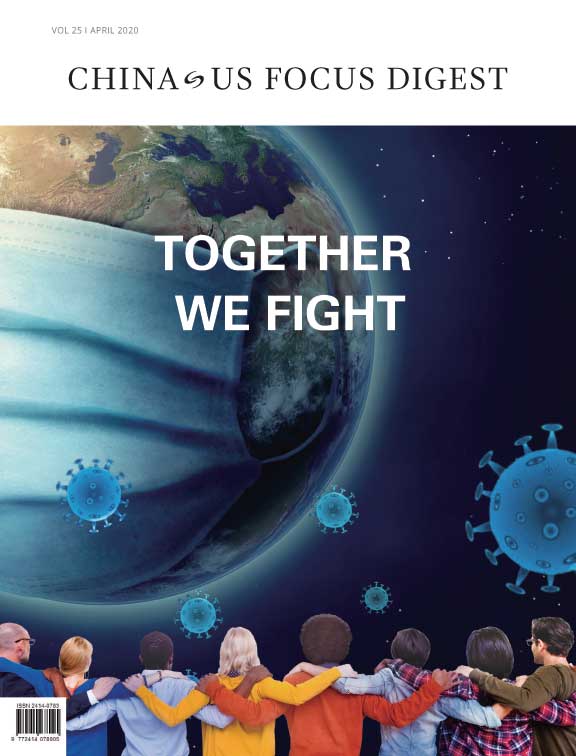Click to read the special coverage on COVID-19
The shock of the combined global public health, economic and financial crises has far exceeded that of the world financial crisis in 2008 its subsequent economic recession. It is a threat to humanity and a severe test of nations’ capabilities for domestic and global governance.
On March 26, the G20 held the first online summit in its history to discuss ways of coping with and overcoming the triple crises. Chinese President Xi Jinping made four proposals, advocating enhanced international anti-pandemic cooperation to stabilize the world economy. Leaders of the G20 issued a joint declaration, and launched a $5 trillion stimulus package.
China, the first victim of COVID-19, achieved a level of control over the pandemic after nearly two months of arduous endeavors nationwide. It bought time for other countries to respond and provided useful references for containment.
But the pandemic has spread globally to affect more than 180 countries, with more than 500,000 confirmed cases and upward of 20,000 deaths. China itself faces a high risk of “imported” cases causing a new wave of infections.
Countries have been upgrading their countermeasures to handle the onslaught, with different degrees of success. The main problem lies in the “disorder” and “fragmentation” of global governance. Countries have largely been working independently without proper coordination, or blending geopolitical considerations with their coronavirus response, lacking the spirit of mutual assistance as envisioned in China’s proposed “community with a shared future for mankind.”
While continuing to reinforce its domestic accomplishments in containing the pandemic, China is already providing assistance to the international community within its reach. So far, four instances of Chinese aid have involved 89 countries and four international organizations, including a $20 million emergency donation to the World Health Organization. A fifth round of aid is being arranged.
Now, the first need is to show firm determination and a willingness to collaborate. The coronavirus knows no borders: This crisis involves all countries, none can claim immunity. Without due international synergy, especially solidarity between major countries, the road to success in containing the pandemic, as well as in reviving the economy and weathering the financial crisis, will be much longer and more tortuous. International cooperation is more indispensable now and should be understood from a new perspective.
This was proved resoundingly during the 2008 world financial crisis. On March 27, Chinese and U.S. leaders, talking by phone, expressed their willingness to collaborate against the pandemic. Hopefully the U.S. side will actively put the spirit of that meeting into practice, forsake geopolitics and ideological prejudices, strengthen cooperation in bilateral and multilateral realms and make joint efforts with China in overcoming the crises. When both countries face an attack of a “gray rhino,” their cooperation is not only of critical significance to themselves but will to a great extent determine whether all countries in the world can truly join hands and turn the crises into opportunities. This is the historical responsibility of the two countries.
Second is to enhance macro policy coordination between major countries. To cope with this major combined crisis, countries have come up with many strict prevention and control measures — monetary and financial policies aimed at invigorating the economy — the scope and forcefulness of which are unprecedented. It is important to make sure such measures are mutually supportive and form synergy, rather than mutually diminishing or offsetting.
Words on macro policy coordination must be put into action. The decisions and promises of the G20 must be executed. The EU convened its own summit following the G20’s to coordinate the pandemic response; the same needs to happen between the EU and China, ASEAN and China.
Particular attention must be paid to the crises’ impacts on globalization, as well as on global supply and production chains. Adjustments and improvements of the existing supply chains are inevitable, but what kinds of adjustments are in the common interests of all countries and are able to prevent broken supply chains from influencing the normal operation of the world economy? This entails further in-depth consultation and coordination. The purpose should be preserving and consolidating global supply chains on the basis of proper adjustments, rather than recreating them.
Third is to preserve the global governance regime and make necessary adjustments — especially to the global public health system, world trade system and global financial system, so as to make them conform better to the needs of globalized development and frequent outbreaks of global challenges.
In the fight to contain the COVID-19 pandemic, countries must unswervingly support the WHO and reinforce its function of emergency coordination. Given their conspicuous roles in global governance and dealing with crises, multinational corporations, industry organizations, media and think tanks also need to be within the scope of cooperation coordination.
Fourth is to pay extra attention to the weak links in the international system and global governance regime, and increase aid for small and medium-sized developing and underdeveloped nations. These countries are subject to greater risks in the face of both the COVID-19 pandemic and the economic recession and financial crisis.
There is nothing wrong with the international community concentrating attention on developed nations for the time being. Yet small and weak African, Latin American, and Asian nations can’t cope with the COVID-19 on their own, or afford the devastating hardships that have been imposed recently.
From the perspective of building a community with a shared future for all mankind, we must make greater efforts to mobilize more resources, to incorporate such nations into the global campaign against the three crises and help them through the challenges.
If we neglect those countries, even if the crises are brought under control in developed places, a relapse is likely. Never forget the world is closely interconnected. In fact, it is indivisible.

